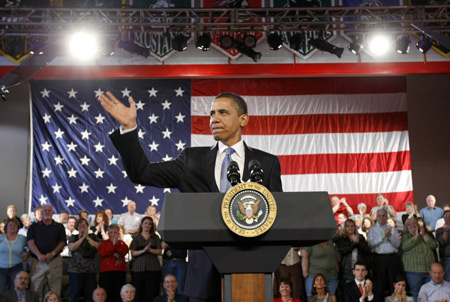U.S. President Barack Obama said Wednesday he is pleased with the progress his administration has achieved over the past 100 days, but not satisfied.
"We are off to a good start. But it is just a start," Obama told a news conference marking the 100th day since he was sworn into office on Jan. 20.
 |
|
U.S. President Barack Obama acknowledges applause as he arrives to speak at a town hall meeting held at Fox Senior High School in Arnold, Missouri, April 29, 2009. (Xinhua/Reuters Photo) |
Mentioning what has been done in his first 100 days in office, Obama said that the economic stimulus package approved by Congress in February has already saved or created over 150,000 jobs and provided a tax cut to 95 percent of all working families.
The 787-billion-dollar stimulus package is designed to jolt the ailing U.S. economy by providing government spending and tax cuts for both individuals and businesses.
"We passed a law to provide and protect health insurance for 11million American children whose parents work full-time," Obama said.
"And we launched a housing plan that has already contributed to a spike in the number of homeowners who are refinancing their mortgages, which is the equivalent of another tax cut."
However, millions of Americans are still without jobs and homes, and more will be lost before this recession is over, the president said, adding that credit is still not flowing nearly as freely as it should.
"Countless families and communities touched by our auto industry still face tough times ahead" and "our projected long-term deficits are still too high," he said.
Obama talked at length about the budget plan for the 2010 fiscal year beginning Oct. 1, 2009. The 3.6-trillion-dollar budget, which was submitted to Congress in February, seeks to shore up the world's largest economy while overhauling health care, energy and education.
"We must lay a new foundation for growth -- a foundation that will strengthen our economy and help us compete in the 21st century. And that's exactly what this budget begins to do," the president said.
"It contains new investments in education that will equip our workers with the right skills and training; new investments in renewable energy that will create millions of jobs and new industries; new investments in health care that will cut costs for families and businesses; and new savings that will bring down our deficit," he added.
Earlier Wednesday, the U.S. House of Representatives passed a 3.4-trillion-dollar budget plan that endorses much of Obama's ambitious agenda including health care reform.
The plan was approved by a 233-193 vote but no Republicans voted for it.
The House budget predicts that the federal budget deficit will rise to 1.7 trillion dollars in the 2009 year, which ends on Sept.30, and then dip to 1.2 trillion dollars in the 2010 year.
The projected deficits would be much larger than the previous record of 454.8 billion dollars set in fiscal year 2008.
The huge deficits reflect the soaring costs of the government's economic stimulus package and financial rescue program, and the recession, which has sharply reduced tax revenue.
On the recent outbreak of the swine flu, Obama said "We are continuing to closely monitor the emerging cases of the H1N1 flu virus throughout the United States."
The disease started out in Mexico and has spread to the United States and elsewhere, posing a new potential danger to the struggling U.S. economy.
"This is obviously a very serious situation, and every American should know that their entire government is taking the utmost precautions and preparations," Obama said.
Some analysts predicted that the flu could stifle trade and force consumers to cut back further, thus worsen the recession which started in December 2007.
To help jumpstart the struggling economy which has snatched 5.1million jobs, the U.S. Federal Reserve on Wednesday held a key interest rate unchanged at a record low of between zero to 0.25 percent.
Concluding a two-day policy-making meeting, the central bank said it see signs the recession may be easing but warned that the economy is likely to remain weak.
For all of this year, the United States, at the center of an intensifying global financial storm, is now projected by the International Monetary Fund to contract by 2.8 percent in 2009, following the 1.1 percent growth in 2008, the smallest gain since 2001.
Noting that there is plenty of work left to do, Obama said Wednesday that Americans can expect "an unrelenting, unyielding effort from this administration to strengthen our prosperity and our security in the second hundred days, and the third hundred days, and all the days after."
(Xinhua News Agency April 30, 2009)